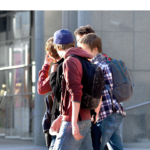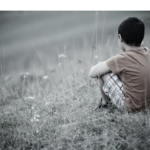
18 Aug The struggle to belong at school: Australia bombs in student satisfaction
Take a moment to reflect on your school years, what were they like? asks Kelly-Ann Allen
Perhaps you fondly recall memories of quality time spent with friends, when you had schoolyard crushes, and did just enough classroom work to get through until the weekend. You might have played an instrument, dominated the sporting scene, or worked hard to be a top student.
Or maybe school was a time to forget. A time of rejection and isolation. You felt self-conscious and didn’t fit in. You dreaded each day as the cruelties of classmates, teachers, parents or others occupied your thoughts.
We all have a need to belong. Educational communities are critical in either supporting and building, or hindering and destroying, a sense of belonging.
Belonging is essential for life satisfaction, happiness, positive self-esteem, long-lasting friendships and help-seeking behaviour – competencies and behaviours that shape adulthood from an early age.
Belonging can also prevent negative behaviours such as fighting, bullying, vandalism, crime, and substance abuse.
According to the most recent Programme for International Student Assessment (PISA) report on what school life means for students in OECD countries, Australia has been graded an “F” for student belonging. And, unfortunately for Australian kids, a sense of belonging has been declining since 2003.
Unless we act now, there may be growing gaps between those who belong and those who are excluded, placing the future educational success and long-term health and wellbeing of many Australian students in serious jeopardy.
Longing for acceptance and long-term consequences
Struggles with belonging at school can manifest in different ways. Some students present with truancy, depression, anxiety, difficulties with staff or peers, disconnections with the school curriculum, or poor grades.
Rather than labelling such behaviours and states as dysfunctional, these provide useful signs to educators. Schools are uniquely placed to help define the personal identity of young people during this high time of vulnerability.
The 21st century brings unique challenges for developing and maintaining a sense of belonging. Young people spend a lot of time at school, and draw on their experiences in the classroom, playground, on the sporting field and in the recreational halls to look for and identify where they fit.
But in 2020, the social landscape goes well beyond the school gates – influenced by the shifting ways in which we connect with our communities and neighbourhoods.
We don’t know our neighbours like we did in decades past. Students often don’t attend their local school, electronic devices consume both classroom and private time, and parents work longer hours and spend less time with their children.
These shifting social structures mean teachers often must deal with psychological and behavioural challenges that arise from the disconnections that occur at home in the community. But teachers often lack sufficient training to deal with the concerns that students present.
And teachers are at a breaking point. More than half of teachers wouldn’t recommend teaching as a profession, citing extreme stress, burnout and the emotional toll they experience from dealing with issues outside the classroom.
School belonging – for both students and teachers – should be on the agenda for primary and secondary schools, along with government bodies concerned with schools.
But, schools can’t shoulder this responsibility alone. We need to be mindful of the systemic pressure national testing may have on students, teachers, school leaders and parents, and question how this is influencing our priorities at a community, school-wide and classroom level. It will take collective efforts to enact positive change and recreate connection.
Parents want their children to be happy and feel helpless when seeing them struggle with social isolation and the potential mental health challenges this brings.
How does Australia fare?
Results from the 2018 PISA report, published at the end of 2019, asked 15-year-old students across the globe to rate their reactions to six statements on how they perceived school:
- “I feel like an outsider at school”
- “I make friends easily at school”
- “I feel like I belong at school”
- “I feel awkward and out of place in my school”
- “Other students seem to like me”
- “I feel lonely at school”
Australian students reported being bullied more frequently, felt more afraid of failing, were more likely to have skipped school and felt lonely at school, compared to students of a similar age in other OECD countries.
About 19 per cent of students in Australia agreed or strongly agreed that they feel lonely at school. This is compared to the OECD average of 16 per cent. More than 30 per cent of Australian school children said they didn’t belong at school.
This figure has been increasing steadily for the past 10 years.
Students who were female, Indigenous or from economically disadvantaged schools felt the least sense of belonging in the classroom.
The results are damning for a nation that prides itself on fostering a classroom culture based on equality, acceptance, and unequivocal support for all students, irrespective of their social, economic or racial pedigree.
While Spain, Austria, Norway and Switzerland lead the way for student inclusivity, Australia joins the US, United Kingdom and Canada – as large, predominantly English-speaking countries – well below the OECD average.
Fortunately, migrant students performed exceptionally well and were more likely to feel a sense of belonging in Australian schools. Cultural traditions, knowledge of cultural history, participating in rituals and rites of passage are contributing factors for building a sense of belonging for migrant students and their families.
Solutions to help students cope in the classroom and at home
In our recent book Boosting School Belonging: Practical Strategies to Help Adolescents Feel Like They Belong at School, Associate Professor Peggy Kern from the University of Melbourne and I developed strategies to encourage student belonging in the classroom. For instance:
Connecting with teachers
When a student has a strong dislike of another person, particularly a teacher, it creates relationship roadblocks. So why not give students an outlet to refocus their thoughts on positive characteristics of teachers and fellow classmates? Giving students opportunities to identify and share “good vibes” about others encourages them to keep searching for the best qualities in their teacher.
Connecting with parents
We all loved the “Hot Potato” game as children, and this concept can be used as a fun way of getting students to bring up fun memories shared with their parents. Students sit in a circle and pass the beanbag (hot potato) to each other in time with music until it stops. Students are encouraged to share their memories with the class – it could be a fun holiday or experience shared together – to which the rest of the class claps to celebrate.
Connecting with friends
Doesn’t it feel great to be recognised for something you had done – whether it be an act of kindness or piece of work you’d spent hours completing? Showing gratitude feels great for both the giver and receiver. Organise students into groups of four to six and have them write a short letter of appreciation to another member of the group.
We’re all in this together
The research is clear. Students who feel a sense of belonging to school subsequently pay more attention in class, do more than is expected of them by their teachers, and earn higher grades. Second to the family home, school is the most important environment in the lives of young people.
Teachers have a critical role to play to ensure they establish a caring classroom community whereby positive student-teacher relationships can form and grow throughout the learning journey. School leaders should consider ways in which student-teacher relationships can be strengthened through existing structures.
Feeling engaged at school is critical for both academic and social success.
Kelly-Ann Allen Senior Lecturer, Educational Psychology and Inclusion Education
This article was first published on Monash Lens. Read the original article







